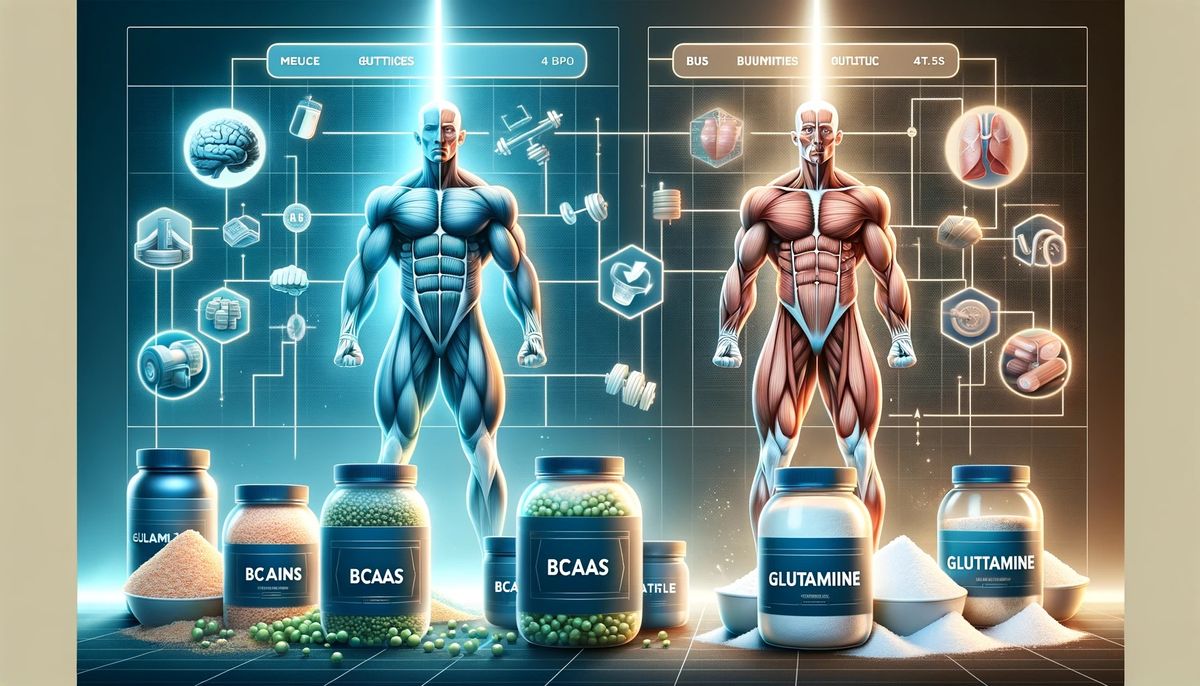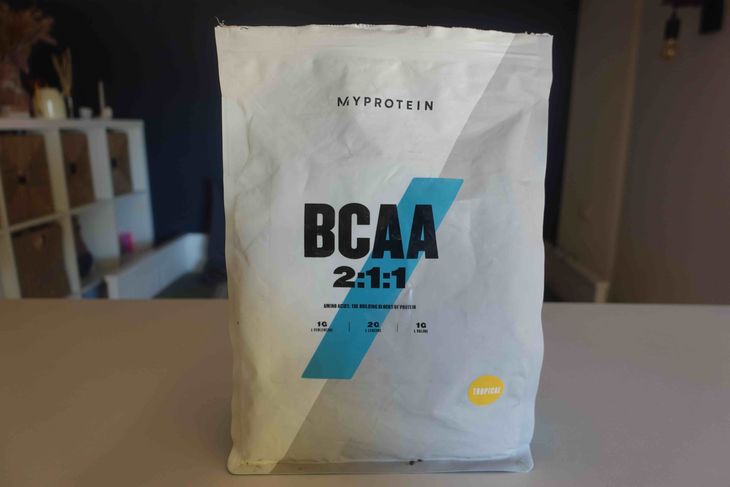BCAAs vs. Glutamine: Which is Better for Muscle Recovery?

In the fitness industry, two of the most popular supplements are Branched-Chain Amino Acids (BCAAs) and Glutamine. They are touted for their roles in muscle growth, recovery, and overall athletic performance. This article delves into their functions, benefits, and how they differ, helping you decide which might be more suitable for your fitness goals.
Essential and Non-Essential Amino Acids: The Basics
Amino acids are the building blocks of protein, crucial for various bodily functions. Among them, BCAAs – leucine, isoleucine, and valine – are essential amino acids, meaning the body cannot produce them; they must be obtained from the diet. The only amino acids considered essential other than the BCAAs are histidine, lysine, methionine, phenylalanine, threonine, and tryptophan.

Glutamine, on the other hand, is a non-essential amino acid, as the body can synthesize it. However, under certain conditions like intense workouts or stress, glutamine becomes a conditionally essential amino acid.
Glutamine: The Most Abundant Amino Acid
Glutamine is the most abundant of the different amino acids in the human body. In fact, glutamine stores make up about 50% of the free amino acids found in skeletal muscle cells.
It's a critical energy source for immune and white blood cells, aids in gut health, and plays a part in brain function. During high-intensity exercise or periods of stress, the body's glutamine levels can be depleted, which can impact muscle recovery, immune function, and overall well-being.
Glutamine supplements are often recommended to replenish these levels, particularly for athletes engaging in prolonged or intense physical activity. The benefits of glutamine include aiding in skeletal muscle recovery, reducing muscle damage and muscle loss, and supporting immune system function.
BCAAs: Key to Muscle Protein Synthesis
BCAAs are directly involved in muscle protein synthesis. They play a significant role in building muscle, reducing muscle breakdown, and alleviating muscle fatigue during exercise. BCAA supplements are especially popular among athletes and fitness enthusiasts for their ability to boost muscle growth, enhance exercise performance, and reduce recovery time.

Leucine, one of the BCAAs, is particularly effective in stimulating muscle protein synthesis. This makes BCAAs critical for anyone looking to build lean muscle mass and improve physical performance. Although it's hard to say which is the most important amino acid for muscle growth, there is substantial scientific evidence that leucine can increase strength and muscle size.
Muscle Recovery and Performance
Both BCAAs and glutamine are vital for muscle recovery. BCAAs reduce muscle breakdown during exercise, while glutamine helps in the repair and rebuilding of muscle tissue. For muscle recovery, BCAAs seem to have an edge, particularly in reducing muscle soreness and recovery time post-exercise.

In terms of improving exercise performance, the benefits of BCAAs include delaying muscle fatigue and maintaining energy levels during intense workouts. Glutamine, while not directly involved in enhancing performance, supports overall health, which can indirectly benefit athletic performance.
Muscle Building and Weight Loss
For muscle building, BCAAs are more directly involved due to their role in muscle protein synthesis. They are essential for those looking to increase muscle gains, especially when consumed before or after workouts.
Glutamine also plays a role in muscle building but in a more indirect manner by supporting overall bodily functions, including muscle recovery and immune health. For weight loss, both supplements can be beneficial. BCAAs help maintain lean muscle mass during a calorie deficit, while glutamine may aid in gut health and appetite regulation.
Cognitive Function
Emerging research suggests potential cognitive benefits from BCAAs and glutamine supplements. BCAAs, particularly leucine, are thought to influence brain function by modulating neurotransmitter synthesis and release, which could enhance cognitive processes like focus and psychosocial function. It is possible that BCAAs improve cognitive function through minimising central nervous system fatigue (aka "central fatigue").
Glutamine, serving as a precursor to the neurotransmitter glutamate, plays a role in synaptic transmission in the brain, potentially impacting cognitive functions. While research into the impact of glutamine supplementation on cognition is still in its infancy, research with mice suggests it may help to minimise the cognitive decline associated with dementia.
Dosage
Typically, 5-10 grams of BCAAs and 5-15 grams of glutamine per day are suggested, depending on the intensity of physical activity and individual needs.
This study in the Journal of Exercise Science and Fitness suggests that 0.3 grams per kilogram of body mass is enough glutamine to significantly reduce muscle soreness after intense exercise. Therefore, a 100-kg individual may require up to 30 grams of glutamine to get the best results, which could be due to a reduction in muscle protein breakdown or enhanced muscle repair.

With regards to the best time to take BCAAs, research published in The Journal of Sports Medicine and Physical Fitness suggests that taking BCAAs after exercise attenuates muscle soreness more than taking them before. In line with reports of reduced soreness post-exercise when supplementing with BCAAs, research also indicates that BCAA supplementation is linked to reduced levels of serum creatine kinase (a marker of muscular damage)
Both BCAAs and glutamine can be taken as powders or capsules. To explore which supplement form might be best for you, check out this article on the pros and cons of BCAA powder vs. pills. For example, if your main concern is the rate of absorption, the most effective way to take supplements may be as a powder. If you’re mainly interested in convenience, BCAAs are also available as pre-mixed drinks.
Growth Hormone
BCAAs and glutamine have a potential role in influencing growth hormone levels, which are crucial for muscle development and recovery. BCAAs can help in augmenting the natural growth hormone response triggered by intense exercise. Glutamine, even in small doses, may modestly increase growth hormone levels, though its impact is more nuanced and not as pronounced.
Post-Exercise Glycogen Synthesis
Glycogen, stored in muscles and the liver, is a key energy source during exercise, particularly in endurance sports. Post-exercise glycogen synthesis is crucial because it helps replenish these glycogen stores, enabling faster recovery and preparation for subsequent physical activity.

BCAAs, particularly leucine, are believed to play a role in this process. Leucine can activate key enzymes involved in protein synthesis, like the mTOR pathway, and this activation may also influence glycogen synthesis. The exact mechanism isn't entirely clear, but it's thought that BCAAs may indirectly activate glycogen synthase.
Glutamine is also thought to contribute to glycogen synthesis after exercise. While its direct role in glycogen synthesis is less clear than that of BCAAs, glutamine is a significant fuel source for immune cells and can help maintain immune function and gut health, which are important for recovery and overall athletic performance.
Medical Conditions
Studies suggest BCAAs can be beneficial in muscle-wasting conditions and may improve symptoms in liver disease by enhancing protein synthesis and reducing liver fat. However, they could exacerbate symptoms in certain conditions (e.g., amyotrophic lateral sclerosis [ALS]) due to altered amino acid metabolism.
Glutamine, known for gut health and immune support, may benefit critically ill patients or those undergoing surgery. Yet, it poses risks in kidney and liver disease, as impaired processing could lead to complications (e.g., accumulation of supplements).
Both supplements have also been examined to see whether they may help with inflammatory bowel disease (IBD), but the current research does not provide convincing evidence that BCAAs or glutamine is of benefit in this context.
Glutamine vs BCAAs: Making the Choice
Choosing between glutamine and BCAA supplements often comes down to specific fitness goals and personal preference.
If the main goal is to enhance muscle growth, reduce delayed onset muscle soreness (i.e., DOMS), and improve recovery time, BCAAs might be more beneficial. If you're looking to support overall health, immune function, and gut health, particularly during periods of intense physical stress, glutamine may be the better choice. Thus, while the main benefits of a sports nutrition supplement like BCAAs are more sports-specific, the main purpose of glutamine supplementation is promote a foundation of general health.
Synergy with Other Supplements
Both BCAAs and glutamine can be taken alongside other supplements like whey protein, creatine, and even coconut water extract for hydration. This combination can provide a comprehensive approach to muscle recovery, growth, and overall athletic performance. In fact, some of the strongest men on Earth combine amino acid supplements with other supplement types, such as protein supplements and creatine supplements. Of course, world-class strength athletes like Mitchell Hooper also consume a lot of real foods to ensure that they have enough protein and calories to avoid going into a catabolic state.
Conclusion
BCAAs and glutamine play distinct but important roles in the body, especially for those involved in regular, intense physical activity. While BCAAs are more directly linked to muscle protein synthesis and recovery, glutamine supports overall health and immune function. Understanding their differences and benefits can help you make an informed decision about which supplement is best suited for your fitness journey. Remember, a balanced diet and adequate hydration are also key components of any successful fitness regime.
If you'd like to learn more about BCAA supplementation, you might like this article on the positive effects of BCAAs for different types of athletes. You might also be interested in this article comparing BCAAs and pre-workout, this one comparing BCAAs and beta-alanine, this one comparing BCAAs and EAAs, or this one comparing BCAAs and creatine. You may also enjoy reading our article comparing creatine and glutamine or our article that compares BCAAs with whey protein.
As an Amazon Associate, the site earns from qualifying purchases.